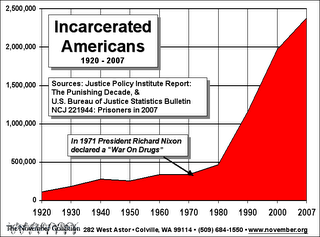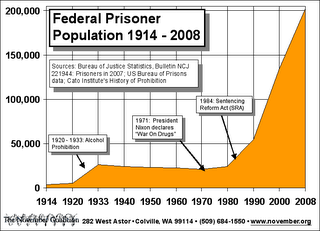Drug Testing and Unreasonable Search
I received an email from a friend today and sure that she would love it if I shared it with all.
Hi Nora,
I haven't written for a while. I have another thing that urks me.
The Bill of Rights tells us that we have the right to ask for a search warrant. The police officer has to show probable cause that he thinks someone may have drugs or alcohol on him to pull him over and give him a drug test or sobriety test. The police has to show good cause to go into your home and search for drugs.
Your body is more personal than your "personal effects" written in the Bill of Rights. If an employer asks for a drug test, he wants the urine specimen that is inside your body. He should have good cause to ask for it. He should assume you are under the influence if he is asking for the drug test. You have the right to say that you want a search warrant signed by a judge. If the employer has a warrant, they can collect the urine specimen that comes from inside you to see if you have drugs in your system. If there are no drugs inside you. You have the right to sue them for harassment. This is enough. It is an invasion of privacy. There are less Americans who do not do drugs than do drugs. I'd like to see the percentage of how many employment drug tests are unfavorable. It's a waste of time and money. It is a disgraceful thing for us to do. It is shameful thing to make us do it.
If they want to see if we "ever" did drugs, they can take a hair sample but then again, they would need a search warrant and they would need probable cause. If we do not appear to be under the influence during the job application process, why must we have to do this?
The Bill of Rights is already written, let's exercise our rights and use it for this, too!!
I'm sick and tired of having to do a drug test just to get a job. I'm 54, not a drug user and want our human and civil rights back!
Not to mention our dignity!
Sandra Bouchard
Hi Nora,
I haven't written for a while. I have another thing that urks me.
The Bill of Rights tells us that we have the right to ask for a search warrant. The police officer has to show probable cause that he thinks someone may have drugs or alcohol on him to pull him over and give him a drug test or sobriety test. The police has to show good cause to go into your home and search for drugs.
Your body is more personal than your "personal effects" written in the Bill of Rights. If an employer asks for a drug test, he wants the urine specimen that is inside your body. He should have good cause to ask for it. He should assume you are under the influence if he is asking for the drug test. You have the right to say that you want a search warrant signed by a judge. If the employer has a warrant, they can collect the urine specimen that comes from inside you to see if you have drugs in your system. If there are no drugs inside you. You have the right to sue them for harassment. This is enough. It is an invasion of privacy. There are less Americans who do not do drugs than do drugs. I'd like to see the percentage of how many employment drug tests are unfavorable. It's a waste of time and money. It is a disgraceful thing for us to do. It is shameful thing to make us do it.
If they want to see if we "ever" did drugs, they can take a hair sample but then again, they would need a search warrant and they would need probable cause. If we do not appear to be under the influence during the job application process, why must we have to do this?
The Bill of Rights is already written, let's exercise our rights and use it for this, too!!
I'm sick and tired of having to do a drug test just to get a job. I'm 54, not a drug user and want our human and civil rights back!
Not to mention our dignity!
Sandra Bouchard



